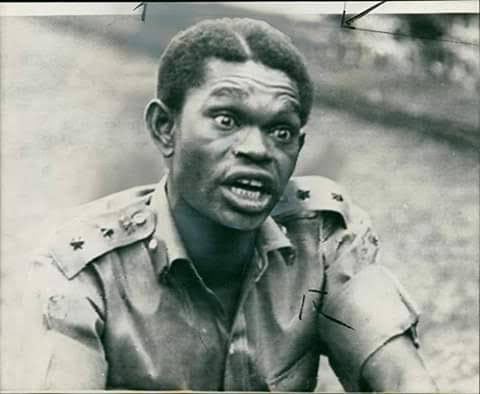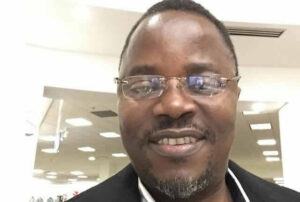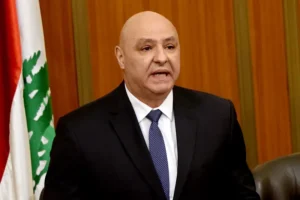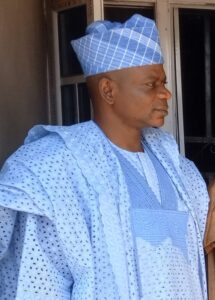
Sayo Àlàgbé
There is no doubt that history has not been friendly to the memory of Brigadier-General Benjamin Maja Adekunle after 10 years of his honourable exit. Permit my euphemism. With series of steps being taken towards preparations that are now at the top gear to mark the decade of his demise, this time around, by the children, relatives and the entire people of the ancient city of Ogbomosoland; truth be told: what Brigadier-General Benjamin Adekunle deserves is nothing but being immortalized, beyond the fun-fare and socio-annual ritual of remembrance!
As time ticks and momentum gathers heat to commemorate the 10th anniversary of the passing of Brigadier General Benjamin Adékúnle, It’s certain and obvious to all and sundry around the world that Nigerians that are familiar with his feats and fame; are in unison to remember not only him as a man, but an enduring symbol of bravery, leadership, and compassion. His life was dedicated to the service of his nation, and his legacy is one that deserves to be preserved and celebrated. Yet, it is with a sense of both pride and sorrow that we recognize how little this country has done to honor his memory. The absence of any significant monument or public recognition of his heroic deeds; stands in stark contrast to the profound impact he had on the lives of countless individuals during a time of national crisis, most particularly, during Nigerian Civil War of of 1967 to 1970: where people of lgbo extraction planned, executed their plans and hellbent on breaking away from Federal Republic of Nigeria; under their own identity known as Federal Republic of Biafra. Historically, it was a botched coup led by late Colonel Odumegwu Ojuwku.
Significantly, Brigadier General Benjamin Adékúnlé, hero and war Commander of Legendary 3rd Marine Commando, one of the most successful units during Nigeria civil war; was not just a military leader, he was a hero, an icon, and a legend! His role in the civil war was pivotal, and his leadership on the battlefield was matched only by his empathy and humanity.
Insightful is the fact that unlike many who see war as a theatre of glory and power, General Adékúnlé viewed it as a necessary evil—a duty to be undertaken with a heavy heart and a sense of responsibility. His approach to war was one of minimizing suffering, not just for his own soldiers, but also for the enemy and the innocent civilians caught in the crossfire. He was a brilliant soldier who combined tact with wit.
Moreover, the civil war was a dark chapter in the Nigeria’s history – a time of great suffering and loss. But it was also a time when the true character of individuals was revealed. Brigadier General Benjamin, unlike many other Nigerias, stood out as a leader who was not only fearless; but also deeply compassionate. He did not lead from behind the lines; he was right there at the fore-front, shoulder to shoulder with his soldiers, sharing in their struggles and their triumphs. His leadership was not about issuing orders from a place of safety; it was about leading by example, enduring the same hardships as those he commanded. A leader by example!
Furthermore, historians of civil wars and related tragedies clearly recorded it that the General Adekunle popularly known as Black Scorpion, was a fiery man, who understood that war, while sometimes necessary, is always tragic. He saw his soldiers not just as tools or collateral of war, but as human beings who needed guidance, support, and empathy. He shared in their pain, their fears, and their hopes, creating a bond that was as much about mutual respect as it was about military discipline. This bond was evident in the way his soldiers followed him into battle, not out of obligation, but out of a deep sense of loyalty and trust.
Historically speaking, what set Brigadier General Benjamin Adékúnlé apart from many of his contemporaries was his unwavering commitment to minimizing the horrors of war. While other commanders might have seen the enemy as nothing more than a target, he was seen to have recognized their humanity. He was known to provide succour to enemy soldiers who were wounded or captured, ensured they received food, water, and medical treatment and reabsorbed then into Nigerian forces. This was not an act of weakness, but of profound strength. It takes a true leader to show mercy in the midst of conflict. It is on record that Benjamin Adékúnlé acted in this capacity without hesitation. He was extremely humane.
Beyond doubt, his compassion extended beyond the battlefield. In the midst of the chaos and destruction, it was evident that he made it a priority to protect powerless civilians. He understood that war often affects those who have no part in the conflict, and he took steps to provide shelter and safety for those who were most vulnerable. In doing so, he demonstrated that a soldier’s duty is not just to fight, but to protect and serve all those in need.
Despite his remarkable service, Brigadier General Benjamen Adékúnlé’s career was tragically cut short. According to his own account, he was forced into retirement due to the machinations of rival soldiers, who felt intimidated by his success and the loyalty he inspired among his men. This act of betrayal did not diminish his legacy, but it did deprive the nation of one of its finest leaders at a time when his wisdom and experience were still seriously needed.
It is sad and mind-boggling that since his retirement, and indeed since his death, the Federal Government of Nigerian (FGN), is yet to fully acknowledge the depth of his immense contributions to national unity. There are no statues, no memorials, no institution named after him, no barrack or major FGN building in his name. The absence of national recognition of his impacts is a catalyst for discouragement and motivation for the present youths and other Nigerians to be inspired. This cannot be an oversight, or as failure to honor a man who gave so much to his country. As preparations is at top gear to mark the 10th anniversary of his death, it is time to correct this oversight, if it is the case.
Remarkably, it is both fitting and necessary that Brigadier General Benjamin Adékúnlé be remembered not just in words, but in lasting symbols. The local government, state, and the nation at large must take concrete steps to preserve his legacy. One of the most powerful ways to do this would be to name an important monument, public building, institution or if possible builds a mini military barrack in his home-town, Ogbomoso; and be named after him. Such a gesture would serve not only as a tribute to his service, but also as an inspiration to future generations. By extension, his family, particularly his children, having a public monument in his honour would be a source of immense pride. It would serve as a reminder that their father’s sacrifices and achievements have not been forgotten. It would be a way for the nation to say thank you to a man who gave so much and asked for so little in return.
Significantly, to name a monument after him would also be a message to all soldiers and citizens; that true heroism is not just about winning battles, but about serving with honor, integrity, and compassion. His legacy is one that transcends the battlefield; it is a legacy of humanity in the face of adversity, of leadership that puts people before power, and of courage that is measured not just in victories, but in the lives saved and the suffering alleviated.
As we reflect on the life and legacy of Brigadier General Benjamin Adékúnlé, we must also reflect on what kind of nation we want to be. Do we want to be a nation that forgets its heroes, that allows their memories to fade away with the passage of time? Or do we want to be a nation that honors those who have served with distinction, that preserves their stories for future generations?
By immortalising him. a monument after the great son of Africa and invincible soldier of soldiers from the land of the valiant – Ogbomoso; we would be doing more than just honoring one man—we would be making a statement about our values as a nation. We would be saying that we value bravery, compassion, and integrity. We would be acknowledging that true leadership is about more than just winning wars; it is about serving humanity, even in the most difficult of circumstances.
In conclusion, the 10th Anniversary of Brigadier General Benjamen Adékúnlé’s passing is not just a time for remembrance, but a time for action. It is a time for theOgbomoso South Local Government as his origin, Oyo State, and Nigeria; to come together and recognize the extra-ordinary contributions of a man who gave everything for his country. By immortalising him in various forms that would echo beyond time and space we occupy now, his legacy would live on; not only in the hearts of those who knew him, but in the minds of all those who would come after.
Brigadier General Benjamin Adekunle’s 10 Anniversary is a challenge that has been thrown to us not allow his memory to fade into obscurity. Let him be honoured while the second chance presents itself now: to retain and pass the baton of his integrity, and humanity to young Nigerians. To whom much is given, much is expected. It is advisable that Federal Government of Nigeria should walk this honourable lane while it will be recognized and satisfactory. Beyond the decade of his exit, it won’t be glorious.
Sayò Àlàgbé is a media practitioner, author and publisher. He could be reached on sayoalagbe64@gmail.com. 07039535757





